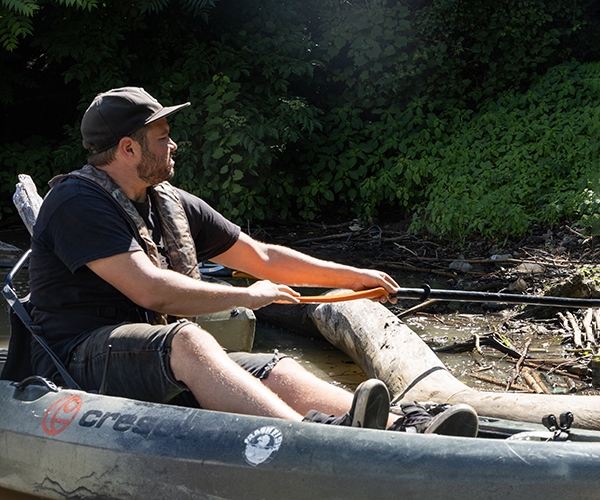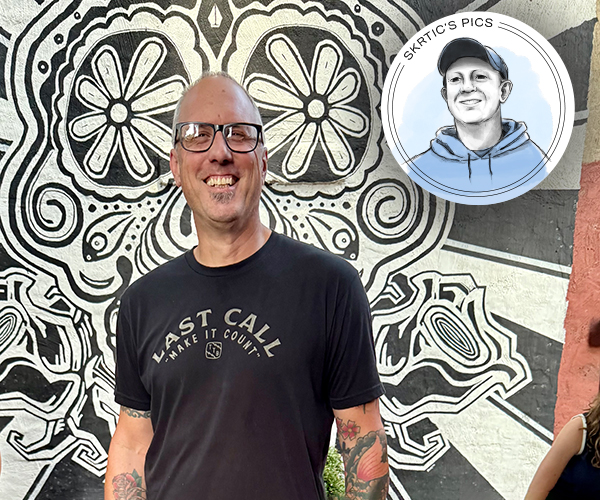Dave Gilbert is not very big: 5-foot-8, a buck-sixty. Buck-sixty-five, tops.
But at this moment, if you close your eyes and listen, the Greater Cleveland Sports Commission CEO is anything but small ? 158 of the alleged 160 pounds appear to be in the veins of his neck.
"I had a frank discussion with the CEO of the Special Olympics, who said he was hoping to bring the Special Olympics to New York or San Francisco for 2011," Gilbert says, holding court with his executive board on a gray winter morning downtown. "That's total B.S. Total B.S. They think they want a big city because it's big. They think bigger sounds better. They think bigger looks better.
"Fine. Let New York or San Francisco go after it too," he rolls on like LeBron to the basket. "I don't care who we'd be up against. We'd do a better job than anybody. We've done it before and we'll do it again."
Wham! with the right hand, as Joe Tait would say.
Understand, the executive board of the GCSC is made up of some of Cleveland's most well connected people. Today's audience includes Bob Kain, vice chairman of IMG; Fred DiSanto, managing partner of Ancora; Wayne Hill, president of Edward Howard and Co. and Joe LoPresti, president of McDonald Hopkins. And right now, there's not a dissenter among them. All they can do is nod their heads in agreement.
Mr. Buck-sixty, the guy with the impish grin who could arguably pass for Jerry Seinfeld's long-lost brother, can talk anybody into anything.
Even into coming to Cleveland.
We like to bitch.
It's part of who we are, our very core.
The glass might be half full, but it still has a leak. The Indians won 93 games last season, and missed the playoffs. Our former mayor thought it would be a good idea to get people to sponsor garbage cans. Welcome to Cleveland. Quit freaking smiling.
Then there's Gilbert and his merry band of sports-chasing gypsies, who have a slightly different point of view: Woe is me, my ass.
Over the last six-plus years, Gilbert has made Cleveland his personal playground for amateur athletics: nearly 60 events and $160 million in economic impact to the city. Count among them The Gravity Games, USA-Ireland boxing event, McDonald's All American High School Basketball game, International Children's Games and the Annual Greater Cleveland Sports Awards. The list goes on.
Three-quarters of a million people have watched GCSC events in places such as The Q, Cleveland Browns Stadium, Public Hall and the Wolstein Center.
Since 2000, Cleveland has hosted 10 different championships in 10 Olympic sports. "I'd be hard-pressed to find another city that's come close to what we've done," Gilbert says. "We used to go to United States Olympic Committee meetings and we weren't even on the radar. Now, we're on the A-list."
Later this month, The Q will host the NCAA Women's Sweet 16 Regional. Next March, Cleveland will have a bad, bad case of basketball fever, hosting the Division I Women's Basketball Final Four.
Put on your nicest T-shirt, 'cause this thing is gonna be big: At least 700 media-types will be roaming the streets. ESPN will be here in full force. And thousands of fans will arrive to support their teams, painted faces and all.
"Don't forget the Road to Cleveland bracket will be in every newspaper in the country, every day," says Gilbert. "This is about the largest event we can host here. In terms of prominence and exposure, it's right up there."
Gilbert is the undisputed leader of a thriving industry in Cleveland. An industry, as ridiculous as it might sound to the rest of us, predicated on selling Cleveland.
"The biggest issue this city faces is our own lack of self-confidence," says Gilbert, back in his office after the board meeting. "Everything could be done better here if we didn't have such a defeatist attitude.
"Having said that, people get behind things here passionately. If we could channel that, there's no telling what Cleveland could do."
Dave Gilbert has a problem.
It's called the crack of dawn (5:30 a.m. to be exact), which is when he's downtown on a treadmill every day. In nicer weather, he runs 40 miles to 50 miles a week outside. And on weekends, he's hanging with a group of runners for a casual "y'know, 10 or 15 miles, depending on whether we're training for something," he says. To date, he's run 19 marathons (best time: 3 hours, 17 minutes). And last year, he completed his first three triathlons, with more planned this summer.
Running, swimming, biking, pitching a city: a true Renaissance man.
"I'm not quite sure he knows how to listen to his body when it's telling him to slow down," says his wife Faith, who should know about this sort of thing, being a licensed physical therapist. "He just keeps going. That's his personality, though."
If he doesn't work out, he's edgy, she says. "So what can you do? I let it go."
The running isn't just for health, either. Gilbert has a history of holding meetings on the run, too. During the Campbell Administration, he'd run with Chief Development Officer Tim Mueller. They'd run downtown, head to Edgewater Park and put in anywhere from 5 miles to 14 miles, "brainstorming ideas, kicking around new events, everything and anything," says Mueller. Now the president of a telecommunications start-up in the Silicon Valley, Mueller still runs with Gilbert when he's in town. "We'll start the run with a little family chit-chat, but then it's right into throwing out ideas," he says. "The guy is a relentless thinker."
When Gilbert's out of town, nothing fosters an air of negotiation like a good old-fashioned 12-mile jaunt. "If I can find someone to run with and talk business, hey, that's quality time," he says. "The kind of time you can't find anywhere else."
Last year, he was on a treadmill next to Dan Malley, the president and CEO of Malley's Chocolates, who mentioned he had just seen a marching band competition in Pennsylvania. It put a beat in Gilbert's drum. The Sports Commission is now considering a band competition like in the movie "Drumline," later this year.
"You never know where the next big idea is going to come from," says Gilbert.
And for a time, it looked as though Gilbert's next big thing was going to come from Southern California, where he'd be basking in the sun, working for one of the most prestigious sporting events in the world. Instead, here he stands, trying to sell the city that wouldn't even buy itself.
In the early '90s while at the Convention and Visitor's Bureau of Greater Cleveland (after stints at the Cleveland Play House and North Coast Harbor), he became intrigued with the thought of working for the Rose Bowl. "I was fascinated with the inner workings of how you put on an event like that," he says.
With virtually no connections and no official openings, he flew to California on his own dime. Within three days, he had a job offer as a PR assistant (which paid half of what he was making here).
"I loved the idea of being involved with the Rose Bowl," he says. "But that was the point when I made the decision to choose Cleveland over sports."
In 1999, he got the chance to do both: The CVB had asked IMG's Kain to chair an independent not-for-profit sports commission. And the chair swiveled right to Dave Gilbert to run it.
When he came aboard, there were a few card tables and one other employee: Rob Marron. "We looked at each other and said, ?OK, let's get to work,' " says Marron, GCSC vice president of operations.
Dave Gilbert is pretty good at fixing things.
In 2003, promising local fighter Mickey Bey Jr., a national Golden Gloves champion and Olympic hopeful, was being heavily promoted for the USA-Ireland boxing event in Cleveland. Except Bey was serving jail time in the Richland Correctional Institution for attempted robbery in connection with a gas station holdup. It would have been a huge embarrassment to the Cleveland boxing community and the Sports Commission.
"We were very nervous, to say the least," recalls Eric Parthen, who was executive director of USA Boxing at the time.
The promoters were ready to pull Bey from their posters and shifted some of their marketing emphasis to another boxer. But Gilbert was confident that Bey would be available to fight. And less than 48 hours before his bout, Bey was released from jail after serving 60 days of a six-month sentence. He defeated Irish boxer Patrick Hyland in front of more than 5,500 people - the largest amateur boxing event in the country that year ? at the CSU Convocation Center.
"In a situation like that, it doesn't help to panic," says Gilbert. "All you can do is figure out the best way to fix it."
"If Dave was nervous, he never let me see it," says Parthen, now the director of National Governing Bodies for the U.S. Olympic Committee. The success of that event led to the U.S. Olympic Team Box-Off in Cleveland the following year.
"The thing I can't get away from with Dave is how respected and connected he is in the community," says Parthen. "If you didn't know any better, you'd think he's been around doing this for 40 or 50 years."
In 2002, Gilbert and Co. convinced the Gravity Games to come to Cleveland after two years in Providence, R.I. Between building skateboard ramps and motocross hills, the Gravity Games are a complex event to coordinate.
"We knew that moving the Games from Providence would be a challenge," says Chris Prybylo, former director of the Games, which moved to Perth, Australia, in 2005.
Among them: the North Coast Harbor location, which made it nearly impossible for visitors to get to the Great Lakes Science Center and Rock and Roll Hall of Fame and Museum. "They could've easily caused a lot of problems - to the point of being a deal-breaker," says Prybylo, now the senior director for the Dew Action Sports Tour in Chicago.
But Gilbert worked quietly behind the scenes, had a solid foundation of trust with Science Center president Richard Coyne and kept everyone happy.
"They knew I wasn't going to get them involved in something that would be a detriment to them," Gilbert recalls. "And it wasn't."
In 2004, Cleveland hosted the International Children's Games, the equivalent to the youth Olympics. It was not only the first time the event had ever been hosted in the United States, but also the first time a U.S.



